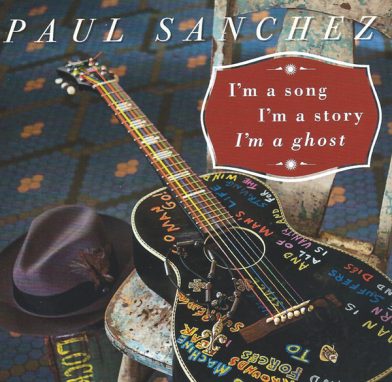A Lonesome Coda
After a prolific few years, Paul Sanchez is rather suddenly saying goodbye. He’s announced that this is his last album—he’s not the first artist to make that decision in the download age—and has since hinted that he may be retiring altogether. As a result, his latest album comes across with more gravitas than usual. Many of the songs stemmed from a recent string of writing collaborations, but in this context they become a summing-up statement; taking in all the music he’s absorbed over the decades (including two songs from Cowboy Mouth days). There’s definite sadness hanging over the album, particularly since he was still recovering his singing voice after a debilitating illness. But what comes through strongest is Sanchez’s trademark generosity.
 That’s clear in the opener, “A Thousand Songs,” which lays out a songwriter’s mission in life (“When I die, they’ll know I was alive.”) Though personal, it has a universal “This Land is Your Land” quality; it’s something that can be sung at hoots and campfires for decades to come. The mood turns grittier in “Walking in Liverpool,” written with Pete Riley and Peter J. Riley Jr. and tellingly not a Beatles-styled song (save for a few dabs of Harrison-esque slide). Rather, it catches the mood swings that a displaced traveler might feel even in a beloved place; it begins with him enjoying the sights and by song’s end he’s dodging painful memories and fearing the next morning. It may well be the darkest song in Sanchez’s catalogue. Also uncharacteristic is the anger that’s aired in “Walking Away”—the album’s only real rocker, about being on the receiving end of unkindness.
That’s clear in the opener, “A Thousand Songs,” which lays out a songwriter’s mission in life (“When I die, they’ll know I was alive.”) Though personal, it has a universal “This Land is Your Land” quality; it’s something that can be sung at hoots and campfires for decades to come. The mood turns grittier in “Walking in Liverpool,” written with Pete Riley and Peter J. Riley Jr. and tellingly not a Beatles-styled song (save for a few dabs of Harrison-esque slide). Rather, it catches the mood swings that a displaced traveler might feel even in a beloved place; it begins with him enjoying the sights and by song’s end he’s dodging painful memories and fearing the next morning. It may well be the darkest song in Sanchez’s catalogue. Also uncharacteristic is the anger that’s aired in “Walking Away”—the album’s only real rocker, about being on the receiving end of unkindness.
The joyful side is in a mid-album stretch of Cajun-influenced numbers, including the Mouth remake “Mary Don’t Two-Step” (which changes the heroine’s name from Maggie) and “Claudine’s Waltz,” a lovely French-sung number written with Michael Doucet. The Cajun flavor also underlines “Bayou Road” and “Louisiana Rain,” lending hope to lyrics about the end of a significant relationship. The album’s emotional heart is in “Everyday’s Never the Same,” a song that acknowledges some deep despair (there’s a striking image of the singer dropping a key into a river, because it no longer unlocks anything) but finds reasons to carry on. It’s graced with a suitably anthemic chorus. After that it’s left to the solo Sanchez to deliver a lonesome coda in the title track.
Anyone who admires Sanchez is bound to come away with a lump in the throat; if this is a farewell, he’s made a moving one. But if he does wind up reconsidering his decision, I doubt there would be much complaining.



